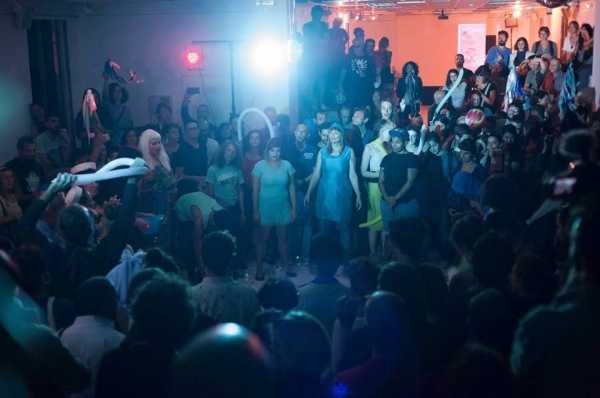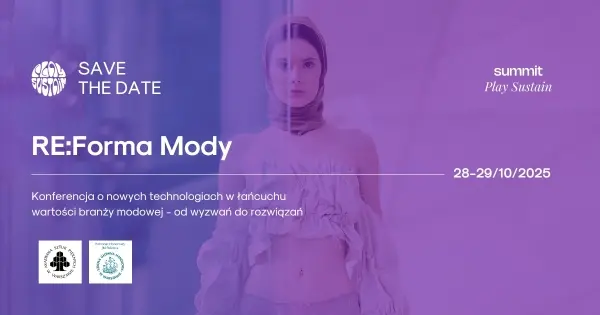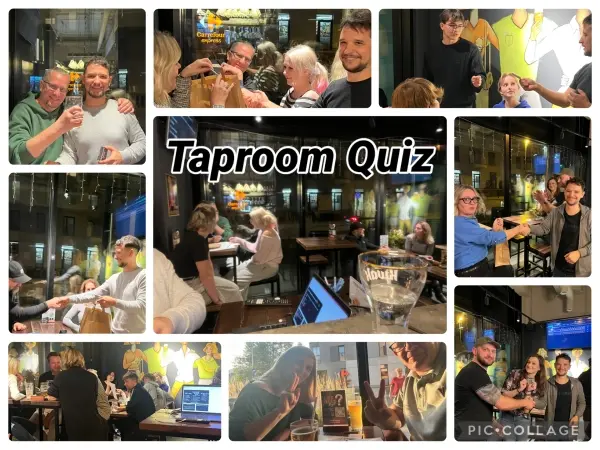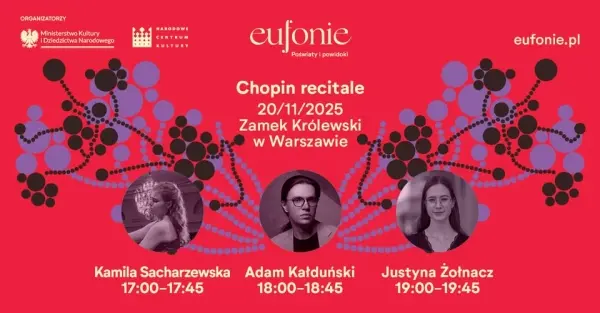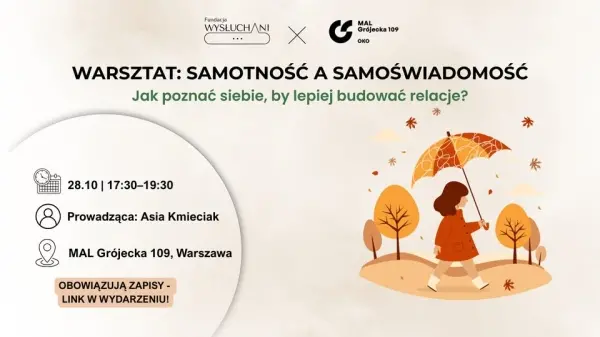Korzystasz z Internet Explorera 8 (lub starszego...)! W związku z tym:
- ta strona będzie prawdopodobnie wyświetlać się nieprawidłowo,
- najwyższy czas na aktualizację lub zmianę przeglądarki! ;)
reklama
reklama
Noc Czarnego Mleka - Parlament Ciał w Warszawie
📅 Data: niedziela, 11 listopada 2018
⌚ Godzina rozpoczęcia: 19:00
📌 Miejsce: Warszawa - Śródmieście, Departament Obecności Pańska 3 (pokaż na mapie)
Szczegółowy opis poniżej ⬇️
⌚ Godzina rozpoczęcia: 19:00
📌 Miejsce: Warszawa - Śródmieście, Departament Obecności Pańska 3 (pokaż na mapie)
Szczegółowy opis poniżej ⬇️
(English version below)
W ramach przedostatniej odsłony Departamentu Obecności w tym roku Muzeum Sztuki Nowoczesnej w Warszawie zaprasza na sesję publiczną „Parlamentu Ciał” zatytułowaną „NOC CZARNEGO MLEKA” która odbędzie się 11 listopada (19:00-5:30) w przestrzeni audytorium Muzeum przy ul. Pańskiej 3.
W programie udział wezmą: Vasyl Cherepanyn, Jodi Dean, Maria Dębińska, Sarah Diehl and Abortion Dream Team, Łukasz Drozda, Vala T. Foltyn / Valentine Tanz, Ayşe Güleç, Kem, Ewa Majewska, Joanna Ostrowska, Paul B. Preciado, Wojciech Puś oraz Anton Tsyhulskyi oraz Magdalena Wawrzyńczak feat. Pat Dudek/MILKBABY, Karol Radziszewski, Natascha Sadr Haghighian, Fuligo Septica, Jan Sowa, Syrena, Igor Stokfiszewski, Adam Szymczyk, Margarita Tsomou, Krzysztof Wolański oraz wideo-obecność: Vaginal Davis, Annie Sprinkle i Beth Stephens, Maria Galindo
„Parlament Ciał” to miejsce artystycznego i politycznego aktywizmu, poszukiwania nowych from uspołecznienia oraz kształtowania sojuszy pomiędzy różnorodnymi formami walk społecznych. Parlament inspiruje się eksperymentalną pedagogiką, metodologiami feministycznymi, antykolonialnymi i queerowymi ,a jego pierwsza manifestacja odbyła się w Atenach oraz Kassel w ramach programu publicznego documenta 14 (8.04-17.09.2017). Od tego czasu przekształcił się on w bezpaństwową instytucję-w-procesie łącząc artystów, teoretyków i aktywistów we wspólnym działaniu. Zadaniem sztuki jest bowiem robienie tego, co porzuciła polityka: ma łączyć ludzi, negocjować sensy i ekspresje, uobecniać problemy oraz mobilizować umysły, ciała i emocje, tworząc zaczyn nowej sprawczości. Organizowany w różnych miastach w czasach powrotu ksenofobicznych państw narodowych dążących do odtworzenia supremacji białych mężczyzn i zniweczenia demokratycznych osiągnięć ruchów pracowniczych, antykolonialnych, czy feministycznych i kontynuowany w Muzeum Sztuki Nowoczesnej w Warszawie „Parlament Ciał” to propozycja zwrócenia się do podstaw: do języka, do ciała, do coraz bardziej zagrożonej wspólnoty.
Dlaczego zbieramy się w ten dzień?
„Parlament Ciał” zbiera się w setną rocznicę odzyskania przez Polskę niepodległości, ejako alternatywa do pompatycznych obchodów ku czci nacjonalizmu, białej katolickiej supremacji i heteronormatywności. Uznając bowiem wzajemną zależność wszystkich żywych istot na ziemi i odrzucając narodową tożsamość jako ramę myślenia o suwerenności w łonie współczesnego kapitalizmu, Parlament Ciał zaprasza do stawienia się na radosnym zgromadzeniu poza ramami państwa narodowego.
Dlaczego zbieramy się nocą?
Parodiując i odmieniając niedawną strategię polskiego rządu, mającą na celu przepchnięcie pod osłoną nocy niepopularnych ustaw i noc uznając za niewidzialne władztwo reprodukcji, zapraszamy artystów i artystki, aktywistki i aktywistów, teoretyczki i teoretyków, performerki i performerów, robotnice i robotników, migrantki i migrantów do wspólnego posiedzenia, debaty i zabawy zachęcając do zbiorowego eksperymentowania z radykalnymi przeobrażeniami sfery publicznej, do wymyślania i tworzenia nowych form podmiotowości.
Co stoi za „rytuałem czarnego mleka”?
Sprzeciwiając się rozrodowi i polityce antyimigracyjnej i celebrując nie-białą, migrancką i odmieńczą cielesność, proponujemy rytuał dzielenia się czarnym mlekiem: ponad podziałami na rodzaje, płcie, rasy, gatunki.
Architektura:
DEMOS (gr. „LUD”) – to przestrzeń zaprojektowaną przez greckiego architekta i artystę Andreasa Angelidakisa na potrzeby „Parlamentu Ciał” działającego w Atenach. Wznoszony, i wzorowany zarazem, na ruinach dzisiejszych demokracji, DEMOS jest przykładem miękkiej budowli w rozpadzie, konstrukcji z fałszywego betonu, budowli przeznaczonej do składania i rozkładania na rozmaite sposoby, reorganizującej wewnętrzną strukturę przestrzeni, tworzącej różnorakie podia do zabierania głosu, przemawiania, performansów, itd.
Co dalej?
Sposobem na kontynuację pracy „Parlamentu Ciał „w Warszawie w przyszłym i kolejnych latach jest powołanie Stowarzyszeń Formy Otwartej, które to Stowarzyszenia gromadzą się wokół lokalnych i ponadlokalnych kwestii (tak politycznych, artystycznych, jak teoretycznych) i są powoływane w charakterze samokształcących, samoorganizujących się grup. Każde stowarzyszenia wypracowuje własne procedury i formułuje własne programy krytyki.
W Warszawie powołane zostaną trzy Stowarzyszenia:
Bezpaństwowe Stowarzyszenie Politycznych Innych (The Apatride Society of the Political Other), zainicjowane w Atenach we wrześniu 2016 roku, rzuci kolejne wyzwanie zakusom państwa narodowego, namysłowi poddając dyskursy i praktyki antykolonialne.
Stowarszyszenie Przyjaciół Halita Yozgata i Pavlosa Fyssasa (The Society of Friends of Halit Yozgat and Pavlos Fyssas) założone w Kassel w kwietniu 2017 celem uczczenia pamięci Halita Yozgata, zamordowanego w Kassel przez neonazistów w 2006 roku oraz Pavlosa Fyssasa, zabitego przez jednego z ateńskich członków skrajnie prawicowej partii Złoty Świt. W Warszawie, stowarzyszenie to będzie kontynuować walkę z instytucjonalnymi formami rasizmu powołując Stowarzyszenie Przyjaciół Maxwella Itoyi – Nigeryjczyka zastrzelonego przez policję na warszawskim Stadionie Dziesięciolecia 23 maja 2010 roku.
W ramach NOCY CZARNEGO MLEKA powołane również zostanie Stowarzyszenie Czarnego Mleka, które bierze na siebie zadanie przemyślenia idei państwa narodowego oraz jego relacji y z zagadnieniem praw reprodukcyjnych, bio- oraz nekropolityki, a także ich związków z rosnącymi w siłę dyskursami patriarchalnymi.
Kuratorzy: PAUL B. PRECIADO, VIKTOR NEUMANN
Współpraca: MARTA DZIEWAŃSKA, PAWEŁ NOWOŻYCKI
>>>PROGRAM
19:00
Paul B. Preciado i Viktor Neumann
Powitanie i wprowadzenie
19:20
Ewa Majewska i Margarita Tsomou
Feministyczny opór wobec faszyzmu. Bezpaństwowość i „nieheroiczny”aktywizm dzisiaj
20:10
Annie Sprinkle and Beth Stephens
Komunikat ekoseksualny
20:20
Sarah Diehl and Abortion Dream Team
Zaufaj kobietom – aktywizm i bezpieczna aborcja
21:10
Interwencja muzyczna
21:30
Adam Szymczyk
czytanie Paula Celana
21:40
Vasyl Cherepanyn i Jodi Dean
Tłumy, partia, nowa Międzynarodówka? Kryzys instytucji a rewolucyjny podmiot zbiorowy w XXI wieku.
22:30
Łukasz Drozda
Ucząc się od “Radosława”
23:00
Ayşe Güleç, Natascha Sadr Haghighian, Jan Sowa, Syrena, Krzysztof Wolański
Stowrzyszenie Przyjaciół Halita Yozgata, Pavlosa Fyssasa, oraz Maxwella Itoyi: Sojusze między działalnością antyfaszystowską w Atenach, Kassel i Warszawie
00:20
Joanna Ostrowska
Wyklęci
00:50
Vaginal Davis
The White to be Angry
1:10
Vala T. Foltyn / Valentine Tanz
Uczucia są faktami – magia, seks i polityka (koncert uzdrawiający)
1:50
Maria Dębińska, Fuligo Septica, Igor Stokfiszewski
Metabolizm Muzeum. Śluzowce przeciw faszystom
2:40
Maria Galindo
Komunikat anarcha-feministyczny
2:50
Paul B. Preciado z udziałem: Vala T. Foltyn / Valentine Tanz
Rytuał Czarnego Mleka: Trans-feministyczna anatomia przeciwko państwu narodowemu
3:50
Wojciech Puś z Antonem Tsyhulskyim i Magdaleną Wawrzyńczak (feat.) Pat Dudek/MILKBABY
4:30
Kem
111118
>>>ENGLISH
The Parliament of Bodies (PoB) announces its next public gathering in Warsaw on November 11, 2018, calling for an anti-fascist, anti-colonial, and transfeminist coalition.
Hosted and incorporated by MoMA Warsaw, the PoB dares to come together on the one-hundred-years anniversary of the Polish National Independence Day, a date known for the hyperbolic celebration of nationalism, white catholic supremacy, and heteronormativity. Acknowledging interdependence of all living beings on the planet and refusing national identity as a framework to think sovereignity in contemporary capitalism, the PoB calls disenfranchised bodies and subaltern organs to gather in a joyful assembly against the nation-state.
Originally conceived as the Public Programs of documenta 14, but having failed to transform documenta’s economy and institution, the PoB mutates into an apatride institution-in-becoming and without constitution that parasites other institutions to provoke critical metamorphosis and repolitization.
Born in 2016 in Athens, the PoB took its name and its vocation from the experience of the failure of representative democracy in Greece during the “OXI” referendum of July 2015. When the Greek government refused to accept the citizens’ decision to reject the conditions of the bailout, the national Greek parliament appeared as an institution in ruins, unable of representing the people. At the same time, for many days, Syntagma Square and the streets of Athens, were filled with voices and bodies of thousands of Athenians and Greeks. But also thousands of migrants and refugees that were arriving every day to the Pyreas port. We needed a counter-Parliament of living bodies beyond markets and nations, as it also became obvious in the city of Kassel and its entagelments with the military industry and its weaponary export to many sites of world conflicts.
The PoB is made of those who lack full political recognition within the framework of the nation-state. It does neither provide a single discourse on identity, nor a homogeneous space of race, gender or sexual representation. On the contrary, it aims to create a new forum for artist and activist, an open arena of experimentation, performativity, media production and debate essential for new planetary somatic democracy to arouse.
The PoB is a place for cultural activism, a critical device to collectively imagine and construct other ways of producing, reproducing and governing knowledge and life, visibility and affect, implicating bodies (human and non-human, objects, dispostifs, ensembles…), subjugated knowledges and artistic practices.
The first public gathering in Warsaw will introduce already established and newly created Open Form Societies. Inspired by the “open form” methodology of Oskar Hansen and modeled on the endeavors of the countercultural antislavery bonds of the late 18th century, the Open Form Societies aimed to work like self-learning, self-organized counter-publics that, housed at MoMA Warsaw, generate their own activities and set their own critical agenda.
During the November gathering in Warsaw the Apatride Society of the Politically Other, established in Athens in September 2016, will further challenge the tropes of the nation-state through exploring anticolonial discourses and practices. The Society of Friends of Halit Yozgat and Pavlos Fyssas, established in Kassel in April 2017, will extend it’s fight against institutionalized forms of racism in Warsaw. Named to honor the memories of Halit Yozgat, murdered in Kassel by neo-Nazis in 2006, and Pavlos Fyssas, murdered by a member of Athens far right political party Golden Dawn, the Society reaches out in solidarity to the family and allies of Nigerian born Maxwell Itoya, shot by police in Warsaw on May 23, 2010.
Curators: PAUL B. PRECIADO, VIKTOR NEUMANN
Collaboration: MARTA DZIEWAŃSKA, PAWEŁ NOWOŻYCKI
>>>THE NIGHT OF BLACK MILK
Coming to Warsaw, the PoB answers to a collective emergency call within the arts and culture: Poland has become the site of development of extreme forms of patriotism, white supremacism, and border protection politics, leading to last years Independence Day march chanting “Death to the enemies of the homeland” during one of the largest far-right demonstrations in the world. In the context of growing neofascist and neocolonial discourses, the PoB acts as a counter-mirror, denouncing the pitfalls of representative European democracies, and understanding politics not as ideology but as poetic actions, learning from and leaning towards the methodologies of art, critical theory, and activism.
In order to face the violent Polish governmental attempts to outlaw abortion and criminalize any form of agency of unruly bodies who contain a possible gestating uterus, the PoB comes to Warsaw to organize a night of non-reproducing nymphomaniacs. THE NIGHT OF BLACK MILK is a gathering of the PoB dedicated to question the politics of reproduction and the white supremacist ideology of the nation-state. Against the reproduction and anti-migration agenda of European nations, and the celebration of non-white, migrant and queer bodies, we propose to share black milk across all kinds of borders: genders, sexes, sexualities, races, bodies, species…
The newly created Warsaw Society of Black Milk, dedicated to explore the biopolitics and necropolitics of the nation-sate and reproduction, and its relation to the development of patriarchal ideologies, will gather for the first time during the celebration of “the rebirth of Poland as a nation”. Surpassing identity politics, we consider nymphomaniacs all bodies engaging freely and joyfully into social, sexual, and mutually caring activities without an agenda of national reproduction.
We shall ask: Who is reproducing and what is being reproduced? What is the location of the uterus within the political economy of the nation-state? Shouldn’t bodies carrying a uterus be considered as the lumpen proletarian class of the world? If this is the case, wouldn’t a large alliance of sexual and reproduction workers constitute the largest political collective across national borders?
We call the workers movements, the transfeminist and queer movements, the indigenous and first people movements, the hackers, pirates and Anonymous movements, the disability and crip struggles, the sex-workers, the anti-prison, anti-psychiatric movements, the migrant and refugees coalitions…we call all non-reproducing nymphos of the world to drink together with us the cup of black milk in an all night long ritual.
Mimicking and queering the recent Polish governmental strategy of imposing unpopular financial and judicial law-making during night hours, and recognizing the night as the invisible realm of reproduction, of prisons and madhouses, of tramps, whores, and caretakers, the Parliament of Bodies gathers for the first time in Warsaw from the sunset to dawn, bringing together artists, activists, theorists, performers, workers, migrants…to experiment collectively on a radical transformation of the public sphere and the proliferation of new forms of subjectivity.
At MoMA Warsaw, the PoB gathers at the architectural site “Demos”. Built by Greek architect and artist Andreas Angelidakis originally created for the PoB in Athens and now transformed into is new home in Warsaw. Inspired by the ruins of contemporary democracy, “Demos” is a soft architecture of fake-concrete ruins that can be assembled and reassembled in multiple ways that reorganize the inner structure of the space and create different platforms for enunciation, speech, display, or action.
Stressing process, production of subjectivity and mutation, the PoB is a time structure, with a score, playing with rhythm and reiteration of movements across boundaries. From November 11 onwards and over the course of 2019, The Parliament of Bodies and its Societies will spread its activities in and beyond Warsaw to create synthetic alliances between different struggles for minor forms of sovereignty, recognition, and survival.
To wydarzenie już minęło.
Sprawdź nadchodzące wydarzenia w dzielnicy Śródmieście lub w kategoriach: inne po angielsku
Inne wydarzenia / informacje / polecane miejsca w Warszawie
reklama
